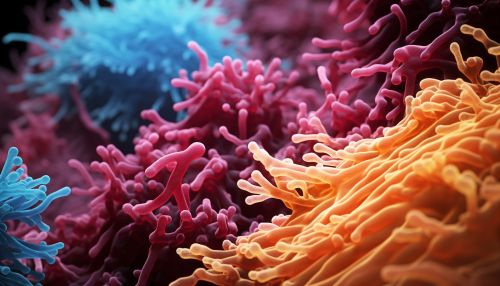Clostridium difficile
Introduction
Clostridium difficile, often referred to as C. difficile, is a bacterium that can cause symptoms ranging from diarrhea to life-threatening inflammation of the colon. Illness from C. difficile most commonly affects older adults in hospitals or in long term care facilities and typically occurs after use of antibiotic medications.
Biology and Life Cycle
C. difficile is a Gram-positive, spore-forming, anaerobic bacterium. The bacterium forms heat-resistant spores that are not killed by alcohol-based hand sanitizers or by routine surface cleaning methods. Consequently, these spores survive in clinical environments for long periods. When conditions are favourable, the spores germinate into vegetative cells which multiply and produce toxins, leading to disease.


Pathogenesis
C. difficile infection is primarily mediated through the production of two large clostridial toxins, toxin A (TcdA) and toxin B (TcdB), and, in some strains, the binary toxin CDT. These toxins cause damage to the epithelial cells lining the gut, leading to inflammation and diarrhea.
Clinical Manifestations
Clinical manifestations of C. difficile infection can range from asymptomatic carriage, to mild diarrhea, to severe diseases such as pseudomembranous colitis, toxic megacolon, bowel perforation, sepsis, and even death. The typical symptoms of C. difficile infection include watery diarrhea, fever, loss of appetite, nausea, and abdominal pain/tenderness.
Diagnosis
Diagnosis of C. difficile infection is based on clinical symptoms in combination with laboratory tests. The most common laboratory tests include stool culture, toxin detection, and molecular tests such as polymerase chain reaction (PCR).
Treatment
The primary treatment for C. difficile infection is with antibiotics that are effective against this bacterium, including metronidazole, vancomycin, and fidaxomicin. In severe cases, surgery may be required. Recently, fecal microbiota transplantation (FMT) has emerged as a highly effective treatment for recurrent C. difficile infection.
Epidemiology
C. difficile is a major cause of healthcare-associated infection worldwide. The bacterium is most commonly transmitted in healthcare settings due to a high level of environmental contamination and the high proportion of patients who are asymptomatic carriers.
Prevention
Prevention strategies for C. difficile infection include careful antibiotic use, good hand hygiene, and thorough cleaning of the healthcare environment. In addition, some hospitals use isolation precautions for patients with C. difficile infection.
Research Directions
Current research on C. difficile is focused on understanding the biology of the bacterium, the mechanisms of pathogenesis, and the host immune response. This research is expected to lead to the development of new diagnostic tests, treatments, and preventive strategies.
